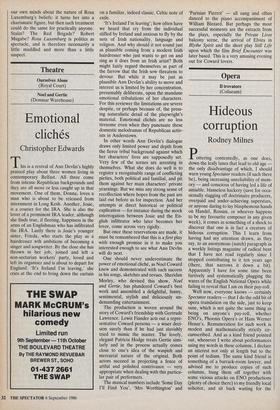Theatre
Ourselves Alone (Royal Court) Noel and Gertie (Donmar Warehouse)
Emotional clichés
Christopher Edwards
This is a revival of Ann Devlin's highly praised play about three women living in contemporary Belfast. All three come from intense Republican backgrounds and they are all more or less caught up in that movement. One of them, Donna, loves a man who is about to be released from internment in Long Kesh. Another, Josie, is a courier for the IRA. She is also the lover of a prominent IRA leader, although she finds true, if fleeting, happiness in the arms of an Englishman who has infiltrated the IRA. Lastly there is Josie's younger sister, Frieda, who starts the play as a hairdresser wth ambitions of becoming a singer and songwriter. By the close she has thrown in her job, joined and left a non-sectarian workers' party, loved and left its organiser and is about to depart for England. 'It's Ireland I'm leaving,' she cries at the end to bring down the curtain on a familiar, indeed classic, Celtic note of exile.
`It's Ireland I'm leaving'; how often have we heard that cry from the individual stifled by Ireland and anxious to fly by the nets of Irish nationality, language and religion. And why should it not sound just as plausible coming from a modern Irish hairdresser who just wants to get on and sing as it does from an Irish artist? Both might fairly regard themselves as part of the farrow that the Irish sow threatens to devour. But while it may be just as plausible Ann Devlin's ability to move and interest us is limited by her concentration, presumably deliberate, upon the mundane emotional tribulations of her characters. For this reviewer the limitations are severe despite, or perhaps because of, the press- ing naturalistic detail of the playwright's material. Emotional clichés are no less tiresome even when they punctuate these domestic melodramas of Republican activ- ists in Anderstown.
In other words Ann Devlin's dialogue draws only limited power and depth from the fierce tribal background against which her characters' lives are supposedly set. Very few of the scenes are arresting in themselves. What she does do well is to register a recognisable range of conflicting pieties, both political and familial, and pit them against her main characters' private yearnings. But we miss any strong sense of recollection where hopes from the past are laid out before us for inspection. And her attempts at direct historical or political explication — for instance during the mock interrogation between Josie and the En- glish infiltrator who later becomes her lover, come across very rigidly.
But once these reservations are made, it must be remembered that this is a first play with enough promise in it to make you interested enough to see what Ann Devlin will do next.
One should never underestimate the power of emotional cliché, as Noel Coward knew and demonstrated with such success in his songs, sketches and revues. Sheridan Morley, who devised this show, Noel and Gertie, has plundered Coward's best work and assembled a delightful, funny, sentimental, stylish and deliciously un- demanding entertainment.
The production is woven around the story of Coward's friendship with Gertrude Lawrence. Lewis Fiander acts out a repre- sentative Coward persona — a wiser deci- sion surely than if he had just slavishly tried to mimic the master. The lovely, elegant Patricia Hodge treats Gertie simi- larly and in the process actually comes close to one's idea of the waspish and mercurial nature of the original. Both actors succeed in projecting a fence of artful and polished contrivance — very appropriate when dealing with this particu- lar pair of performers.
The musical numbers include 'Some Day I'll Find You', 'Mrs Worthington' and `Parisian Pierrot' — all sung and often danced to the piano accompaniment of William Blezard. But perhaps the most successful moments are the extracts from the plays, especially the Private Lives balcony scene, the arrival of Elvira in Blythe Spirit and the short play Still Life upon which the film Brief Encounter was later based. This is a very amusing evening out for Coward lovers.






































 Previous page
Previous page